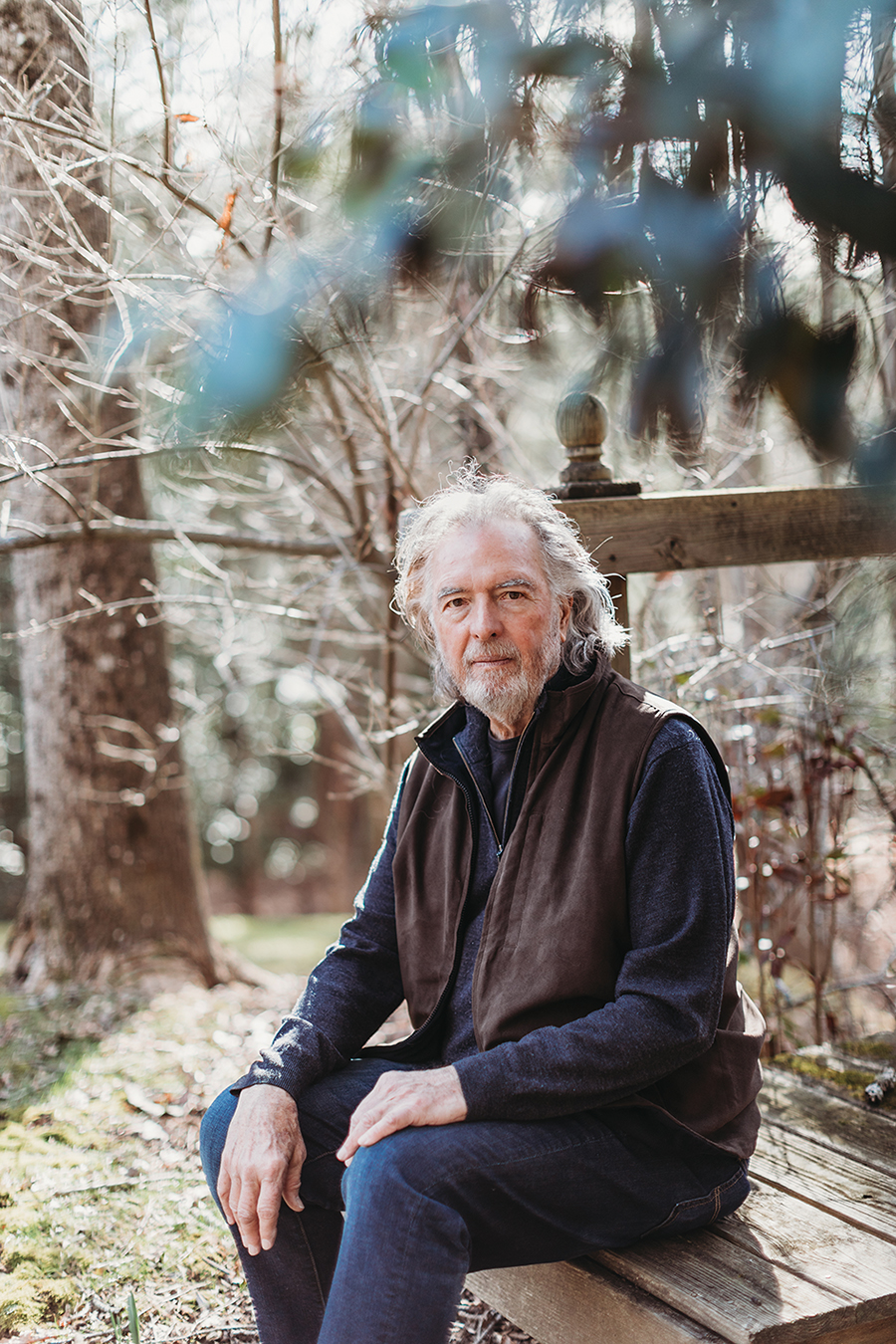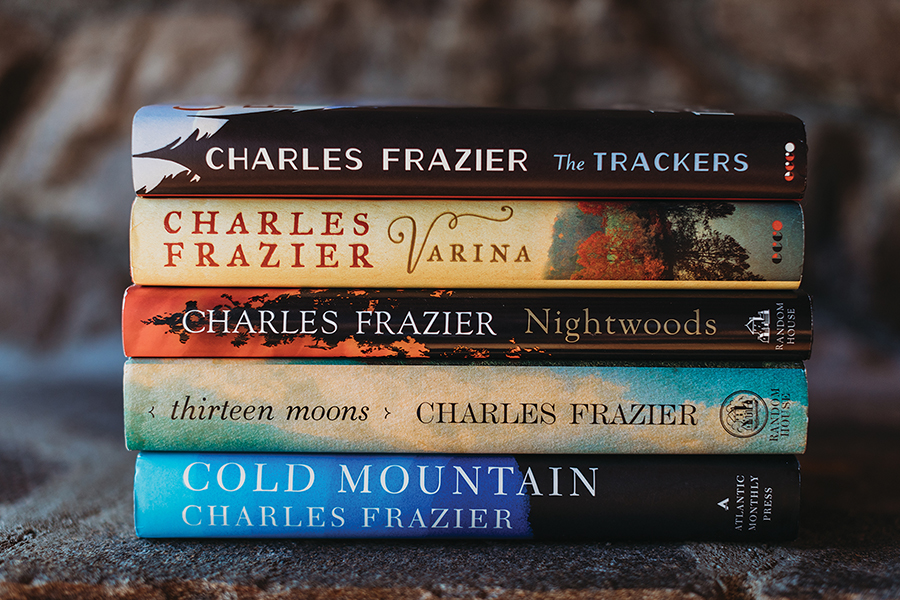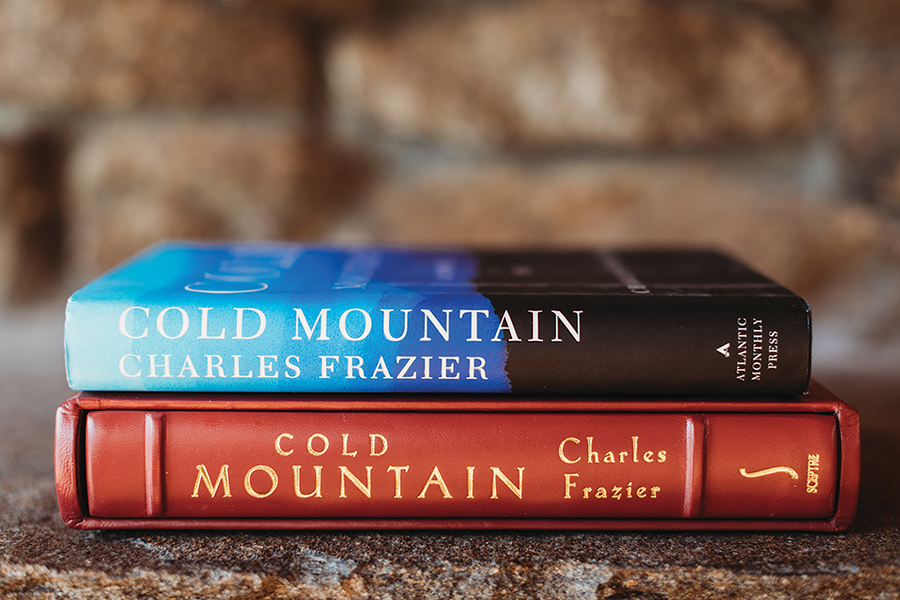Creators of N.C.

The Right Track
On the trail with Charles Frazier
By Wiley Cash
Photographs By Mallory Cash
 The first time I met Charles Frazier was in Asheville back in the spring of 2016. Along with several other authors, we had been invited to participate in a fundraiser at the Asheville Community Theater. I knew most of the authors there that evening, but I didn’t know Charles, and I was nervous about meeting him. Like most people in the world, I had read Cold Mountain after it won the National Book Award in 1997, and then I saw the Oscar-winning film, which starred Nicole Kidman, Jude Law and Renée Zellweger, when it was released in 2003. I’d read the two novels he’d published in the intervening years. My love for them only contributed to my nervousness at the idea of meeting their author.
The first time I met Charles Frazier was in Asheville back in the spring of 2016. Along with several other authors, we had been invited to participate in a fundraiser at the Asheville Community Theater. I knew most of the authors there that evening, but I didn’t know Charles, and I was nervous about meeting him. Like most people in the world, I had read Cold Mountain after it won the National Book Award in 1997, and then I saw the Oscar-winning film, which starred Nicole Kidman, Jude Law and Renée Zellweger, when it was released in 2003. I’d read the two novels he’d published in the intervening years. My love for them only contributed to my nervousness at the idea of meeting their author.
But apparently Charles Frazier wasn’t one bit nervous about meeting me. He walked right up to me backstage and said, “I was up in Hot Springs a few months ago, and I saw that you were scheduled to do an event in town. I left a note for you at the public library. Did you get it?”
Reader, I was too shocked that Charles Frazier even knew who I was to be shocked by his reliance on paper technology. Needless to say, we’ve been friends ever since. He joined me onstage a year later for an in-conversation event for the launch of my novel, The Last Ballad, and I did the same for him when his novel, Varina, was released in 2018. We’ll be back onstage together on April 10 on the campus of UNC Asheville for the launch of his latest novel, The Trackers, a book that will both please and surprise fans of Charles Frazier.
There’s an old saying that serious writers never write the same book twice, and Charles never has, but he has almost always written about the same places, which is to say Appalachia and the Southern United States. The surprise that’s in store for readers is that The Trackers, which is set in Depression-era America, ranges far afield from the swamps of Florida to the big skies of Wyoming to the sooty factory towns and transient camps of the Great Northwest. But readers who loved Charles’ previous novels will find echoes of those works in his new one. Like Cold Mountain, The Trackers is the story of a man on a quest. WPA mural painter Val Welch is in pursuit of Eve Long, the wife of a wealthy rancher who has absconded with a priceless piece of artwork, and like Thirteen Moons (2006), the new novel is awash in era-appropriate research, from automobiles to art and architecture to the politics of the New Deal. Like Nightwoods (2011), The Trackers expertly employs noir tropes like tight, scene-driven dialogue and dark, ominous settings, and like the titular character in Varina (2018), Eve Long is a dashing, magnetic heroine: a former runaway turned traveling honky-tonk singer who finds herself married to a wealthy political hopeful before pulling the plug on it all and disappearing without a trace. Her husband, who is sponsoring Val’s mural project in a local post office, makes Val a financial offer he can’t refuse: track Eve and find out where she is, why she left, and, most importantly, who she really is.
According to Charles, it was nearly 10 years ago when the idea for the novel that became The Trackers first came to mind.
“We were up in Boone, and I was just killing time,” he says. “I visited the post office, which has one of those Depression-era WPA murals. After that I had more time to kill, so I went to the library at Appalachian and looked up information about WPA projects, specifically the Treasury Department art projects. One of the first images I saw was a photograph taken inside one of those small post offices, and there was a mural in progress on the wall with two young guys working on it. Standing on the floor looking up at them was an older guy and a woman. They were both well-dressed, and I thought, OK, there’s a story here.”
As the story rattled around in his mind over the following months and years, Charles dispatched with one of the two mural artists and focused on a single artist and how he might interact with the well-heeled couple who were watching him work. Artist Val Welch and rancher Jake Long and his mysterious wife Eve were born.
Charles and I are standing in the midcentury modern house he and his wife, Katherine, own in Asheville, a home that’s not quite ready for them to inhabit. Like many people in post-pandemic America, they’re waiting on the right contractor to come along to update the house and make it fully habitable. For now, Charles has set up a writing desk in the light-filled living room, a stone fireplace against one wall and tall windows opening to the yard, where, despite it being mid-January, the view is alive with greenery.
I think about Inman, Ada and Ruby, the three characters who drove the narrative in Cold Mountain, and ask Charles if there’s something that spoke to him about using a similar triangulation of characters in The Trackers.


“Well, that’s one of the things that appealed to me while writing this book. I could keep a handle on the relatively limited number of characters because I have a problem sometimes with expansion,” he says. “Having that very clear arrangement of characters helped me keep it under control and forced me to focus on trying to keep the book short. But, in The Trackers, Eve is the reason the triangle exists. I never lost sight of her as the main character.”
Eve is no doubt the main character. Even when she’s not on the page, her presence drives the action and tension. And even though this book is relatively short in comparison to some of his longer novels, many of the scenes feel expansive because Charles allows them to breathe and exist as the reader witnesses them in what feels like real time. One scene that comes to mind unfolds over a long night in the swamps of Florida when Val encounters Eve’s former in-laws, a dangerous band of lawless folks who are as suspicious of Val’s outsider status as they are of his questions about their former daughter-in-law’s whereabouts.
“That was a really fun scene to write,” Charles says. “It was fun to get that rhythm, that really slow, heavy rhythm to the dialogue and pacing. This is the point in the novel when Val is beginning to learn that he is truly in over his head.”
There were points in writing The Trackers when Charles began to fear that he was in over his head too, especially when the pandemic struck and he could not make use of the location scouting that had benefited all of his previous novels and brought the realities of place and landscape to the page. But he had an ace or two up his sleeve when writing about the West and about Florida: He and Katherine spent the bulk of the 1980s living in Colorado with their young daughter, and after Cold Mountain was released, they resided full time on a horse farm in central Florida. Of course the process of writing The Trackers was full of research, but when you read the novel and encounter far-flung Western states, the boggy swamps of Florida and people who understand horses intimately, you are encountering worlds that Charles Frazier knows well.
If you read the novel, you might also be reminded of a literary genre Charles also knows well: the travel narrative, which his novels certainly borrow from, especially Cold Mountain and Varina. But it is his lesser known first book, Adventuring in the Andes, a travel guide published by the Sierra Club, that most reflects his love for the genre.
During the long years of writing The Trackers, especially during the COVID lockdown, travel was on Charles’ mind, and he was itching to get out West and look around, but he found himself settling for photographs, music and art that was resonant of the West in the 1930s, especially Woody Guthrie and Diego Rivera. But writing a novel as complex and rich as The Trackers is hard, and it takes a long time, despite how many books you’ve published before or how many millions of copies they’ve sold.
“It doesn’t get any easier,” Charles says. “At least it hasn’t gotten any easier for me. And I’m just an enormously disorganized writer. Every time I finish a novel I’m a little bit surprised.”
As if to give insight to the expanse of hours spent at his desk, he shows me the tiny slips of paper he uses to record his word counts along with the dates of his daily writing sessions. When I look at his handwriting I can’t help but be reminded of the note he left for me in Hot Springs years earlier, and I wonder how Val Welch would go about tracking it down.
Well, I’m no tracker. So, to the people of Hot Springs, North Carolina, if you find a little slip of paper that contains a message that Charles Frazier wrote to Wiley Cash years and years ago, do me a favor, hang onto it until I’m back in town. PS
Wiley Cash is the Alumni Author-in-Residence at the University of North Carolina at Asheville. His new novel, When Ghosts Come Home, is available wherever books are sold.
